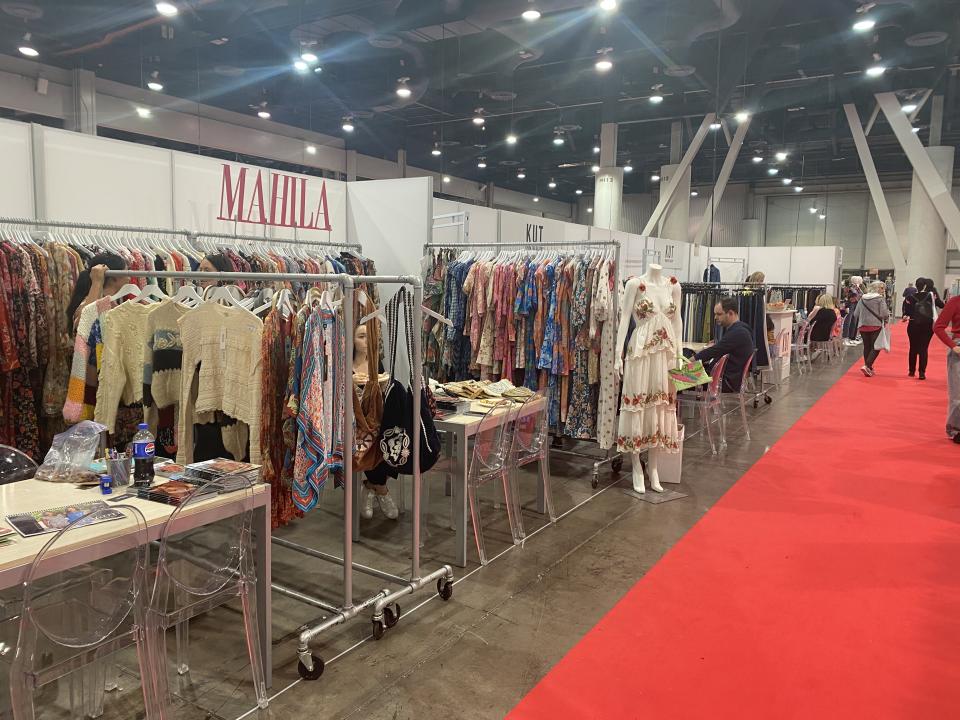Womenswear Retailers at MAGIC and Project Sought Capsule Collections

LAS VEGAS — Retailers these days have a new mantra: Look for mix-and-match capsule collections for price-conscious consumers coping with high grocery store prices and expensive gasoline.
“I’m staying away from trendy pieces and want something that is going to have longevity,” said Gianna Mezzone, the owner of Gigi B’s Boutique, an online site based in Houston. She was on the hunt for slacks, vests, button-down shirts and a lot of neutral tones. “I want things people can wear multiple days and wear differently so it looks like a different outfit when they take a photo….Right now, the capsule wardrobe is really in.”
More from WWD
Roberto Cavalli CEO on Bringing Coolness Back, Developing Distribution
MAGIC at 90: The Show Continues to Be a Draw for Contemporary, Streetwear Brands
Other retailers in town for the MAGIC and Project trade shows held Feb. 13 to 15 at the Las Vegas Convention Center were on the same mission. Gone are the post-pandemic consumers eager to snap up bright colors and unique patterns. They have sobered up as life slowly returns to working in an office and budgets are under constraint.
Jenna Jackson, owner of JJ Chic, an online women’s clothing site based near Denver in Parker, Colo., was picking out pieces her clients could have fun mixing and matching to keep their wardrobes alive. “I really believe that people have become more intentional about what they wear,” she said, noting her annual revenues were down 10 percent from the previous year as customers became more cautious.
One of the top items she wanted was denim, which was true for other retailers. Candice Snyder, owner of the online boutique Fashionology 101 in Victorville, Calif., has sold more jeans this year than usual to her customers, whose ages range from 26 to 34. “We are really big with jeans right now,” she said. “We are also looking for clean, cheap looks with a little bit of luxe but also a little bit of comfort. We are not buying any clothes with real big patterns or that are colorful or flashy.”
This was to counter the 10 percent revenue drop she saw this year. “I don’t know why that is. Maybe because it is a voting year. People are scared with their money right now,” Snyder said. “They are just buying necessities.”
Capsule collections were going strong in Canada, too. Kate Thompson, the owner of Lordon, a trendy boutique in Saint John, a seaside city in New Brunswick, said she was specializing in elevated basics as well as workwear for the office. “I want items you can intermingle, wearing them multiple different ways,” she explained.
Trousers were an important item at her store, where prices rarely go over $100 an item. “We are definitely doing capsule collections,” Thompson said, which has helped raise revenues 8 percent this year over last year in a city with lots of oil industry workers.

The transition to more capsule collections hasn’t been lost on the manufacturers showing at the trade shows. Many of their collections embraced basic essentials and solid colors to accommodate trends.
At the Flying Tomato booth at MAGIC, one side of the large space was brimming with brightly colored dresses and tops in a rainbow of in-house designs created by the company headquartered in Vernon, an industrial area next to Los Angeles. But last August, the company launched a new line called FreeMarket with toned-down neutral prints for a trendy, casual contemporary look. There is textured denim for jackets and dresses and wide-leg denim pants. Peasant and bandeau tops in muted prints are popular as well as shirtdresses, and short and shirt sets. Wholesale prices range between $25 and $35.
Carol Lee, Flying Tomato’s vice president of sales, said the new label was created by company co-owner Debbie Oh. “She really wanted to offer something completely different from what was existing now. Something hip but a little bit easy,” Lee said.
Richer Poorer, another California company, was also selling elevated essentials in rich tones that were front and center at the company’s booth at Project. The decades-old brand took a few seasons off from the show but was back after being acquired last year by Francesca’s, a decades-old specialty retail chain headquartered in Houston.
Tom Law, sales manager for Richer Poorer, was surprised by the number of drop-by retailers inquiring about the brand’s collection of T-shirts, relaxed maxidresses, cotton/poplin dresses, oversize linen blazers and recently launched cotton/wool sweaters. “We’ve seen more than 20 new accounts that didn’t have appointments,” Law said, noting they didn’t write orders but took good notes. Law also had 10 appointments set up.
Retailers were attracted to Richer Poorer for its garment-washed cotton T-shirts and recycled fleece made from used plastic bottles. Colors gravitated toward soft hues including steel blue, sage green, caramel and warm gray with retail prices ranging from $40 to $150.
Another manufacturer at Project offering essentials was Elbert Chang, chief executive officer of LAmade, which makes all its knit apparel in its Los Angeles factory with 50 workers. Chang said he was reducing his margins this year to accommodate buyers looking for better prices. Business has been tough, and the show was no different.
But just as he said that, Heather Bath, who works for the online travel essentials retailer Mersea, stopped by during the show’s last hours to ask about filling a small order of black T-shirts that could expand to other items. It was a nice ending to the show, Chang said.
Best of WWD

